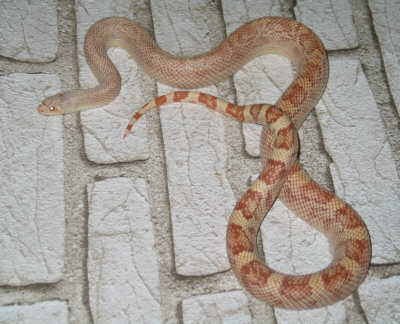|
Distribution |
|
This snake lives in great parts of Florida, with exeption of the Counties southeast of the Lake Okeechobee. Northern of Florida it lives in the south of Alabama and the south and southeast of South Carolina. Further distributions of this subspecies in eastern South Carolina and in North Carolina (Wright & Wright, 1957) were in the last decades transfered to the subspecies melanoleucus. Natural intergrades occure with the black pine snake in the extreme north west of Florida and the adjected Alabama. With the northern pine snake there are intergrades in the milddle of Georgia and the middle of South Carolina.
|
|
Description |
|
The ground color of this snake is an asch grey to rusty brown. On the back there are washed saddle spots, wich clear up and darken towards the tail. The saddles can be brown or redish colored. Typical there are aprox. 25 to 31 body saddles and 5 to 10 tail spots. On the sides there are variable dark spots. Too, there is a patternless variant, in wich the saddle spots were vanished. The normal color of this variant is ash grey to isabell color with sometimes little black spots or brownish longitudinal stripes. Total lenght: up to max. aprox. 2,30 m, only a few animals grow bigger than 2 m. From keeping in terraria I know one patterless male, wich were aprox 2,1 m.
|

|
|
The scales are keeld. In middle of the body there are minimum 29 scale rows, mostly it are 31-33. Speciality in head scalation: 4 Prefrontalia. The snout scale is higher than broad (Rostrale - Nasale 1:1,5). Amelanistic animals have redish saddles on yellowly to light redish ground color. The intensity of the saddle color rises toward the tail. In the terrarium ther occure snow animals, too.
|
|
Habitat |
|
The Florida pine snake lives in light turkey oak and longleaf pine forest and sany areas with only a little vegetation. Old farm land seldomly is a habitat, too. Their distribution often is adapted to the pocket gopher rats. This snake behaves rodent tunnels or sometimes the burrows of gopher tortoises. Because of the decreasing of the gopher tortoise populations this places become seldom. It lives in 0 to 150 m elevation.
|
|
Way of life |
|
Sientific works showed, that the southern pine snake stays aprox. 85% of its lifetime in the tunnels of rodents or gopher tortoises. This subspecies is endangered because of the loose of ist habitat to mankind. Former habitats are f.e clearcut and converted into fruit plantages and watered. Too, fire ants came from South America and sometimes decrease the poulation of this snakes. In Florida it is a Species of Special Concern. Every inhabitan of Florida is allowed to catch and keep one animal, but reproduction and trade of the normal color variants are strictly prohibited.
|
|
Diet |
|
In the habitat this snake preys mainly upon several sorts of rodents, birds and their eggs. Young florida pine snakes eat lizards, too.
|
|
Hibernation |
|
This snakes hibernate several weeks in underground, wich depends on weather and locality. In the south of its distribution the winters are mild and sometimes there are animals sighted out of their hiding places in December or Jannuary.
|
|
Reproduction |
|
Global details to reproduction you can find at -genus Pituophis- . The female lay in June or July at a suitable place a clutch of 4-8 huge eggs. These measure aprox. 70-110mm in lenght and have a diameter of 30-50mm. In September or October the Florida pine snakes hatch. Then they have a lenght between 36 and 60 cm. The coloration is adapted to their parents, but the coloration is a little bit lighter. Sometimes the young look similar to the hatchlings of the subspecies Melanoleucus, but the saddle spots of mugitus are brownish and not black.
|
|
Keeping in terrarium |